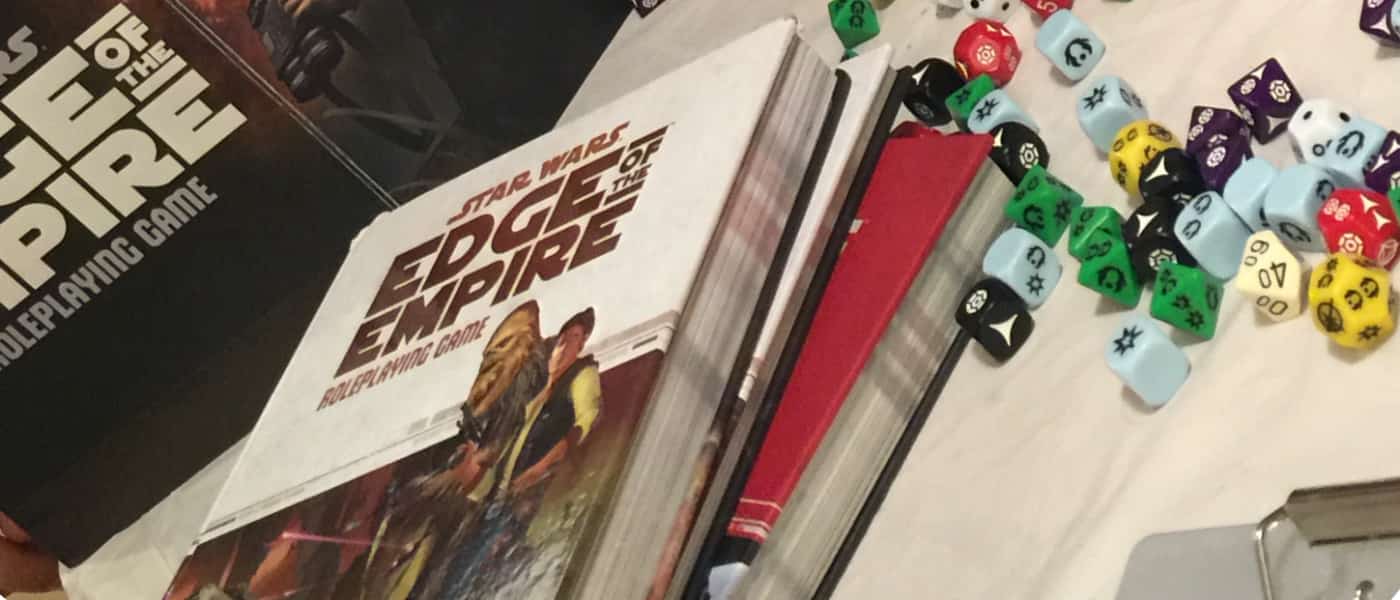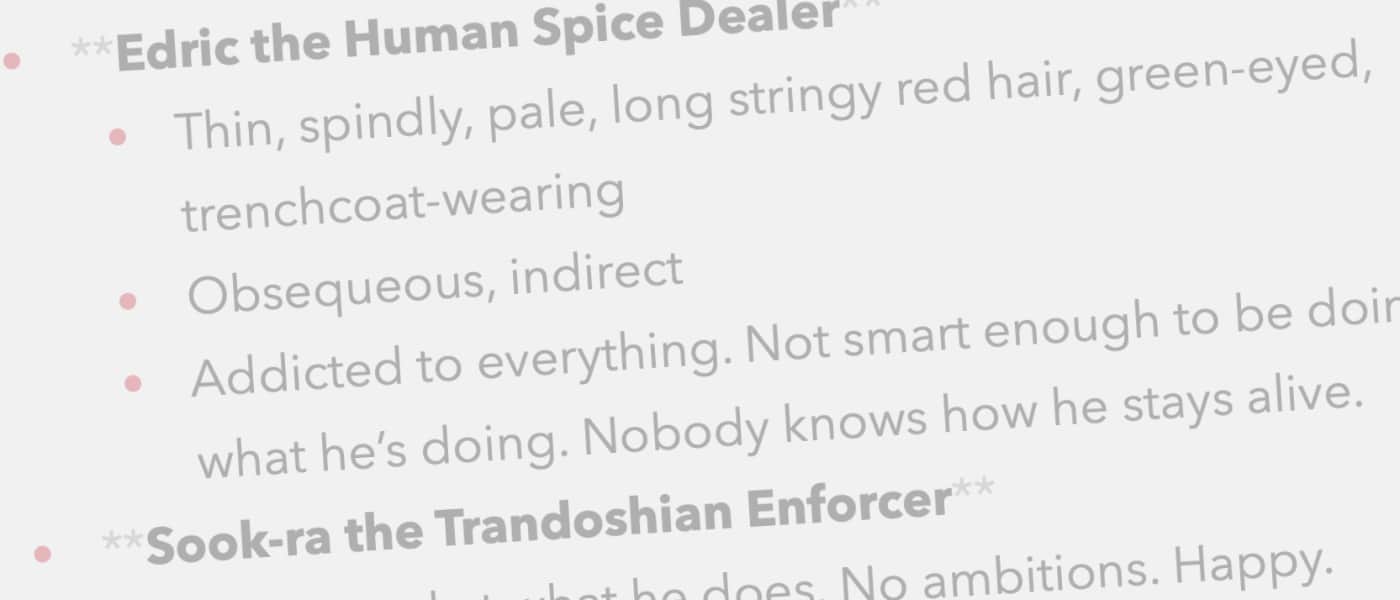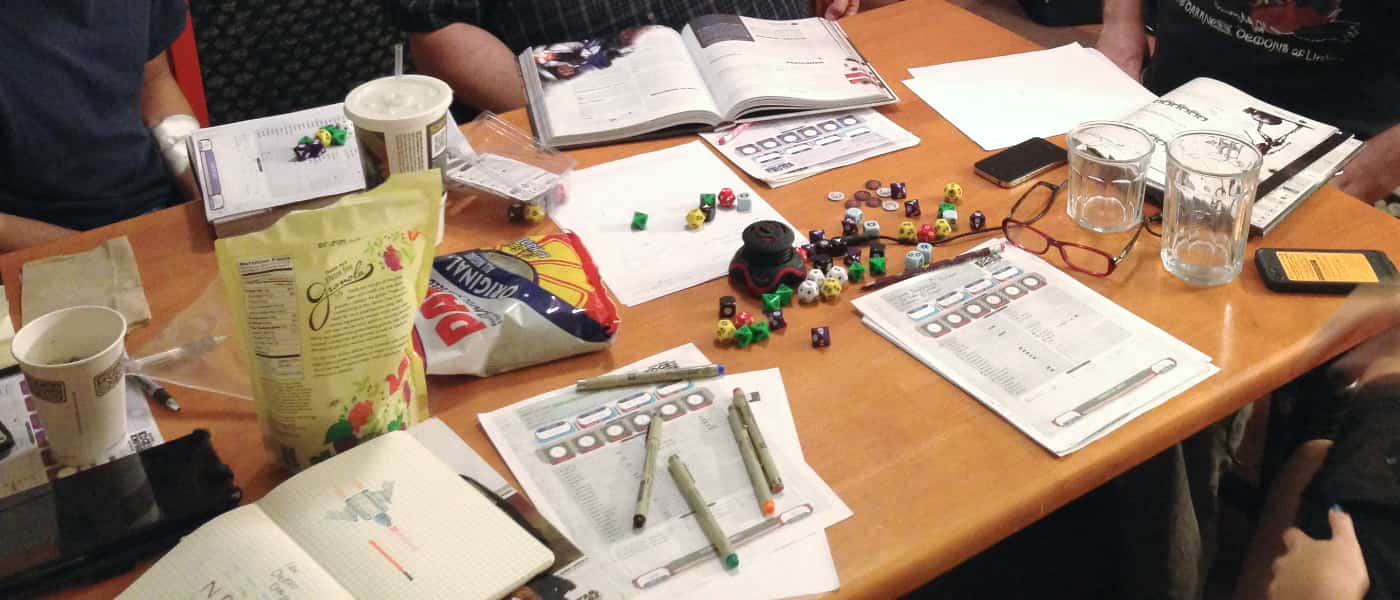Starting Your First Campaign
Sometimes it’s hard for new GMs to get past the nuts and bolts of game mechanics and into actually running sessions. Using a Star Wars: Edge of the Empire campaign I ran for several months, here are some tips that may help you get your first campaign rolling if you’re not relying on a published scenario.
Find a Game, Setting, and Themes
First, we had already played Star Wars: Edge of the Empire and knew we enjoyed the game. The players and I got together and talked about what kind of Star Wars campaign we wanted. I had a concept based on the player characters all being low-life criminals in a city called Savroia, loosely modeled off Bangkok, set on the planet Ord Mantell.

Everyone liked the idea. The players decided that the primary motivation for their characters would be to move up the hierarchy within their criminal organization, with the goal of eventually taking it over and becoming powerful within the city at large. The players knew their characters would be operating in the Star Wars universe, and at that time in the timeline, a big civil war consumed the galaxy. So they knew that would provide plenty of complications as well as potentially lucrative opportunities. Many a criminal enterprise has gained power during war.
I had an advantage in that I knew the players would go for this sort of approach to Star Wars. I’ve run many games for them and I know as a group they tend to gravitate toward antiheroes and misfits rather than shiny good guys. It’s just more interesting for them to find the humanity in morally ambiguous characters than play heroes most of the time. But I made sure to check with them. We also talked about how their individual characters would mesh – why are they together, what benefits do they derive from each other, how much (or how little) do they care about each other, and so on.
Within that frame, the players each developed individual motivations for their characters. The Doc wanted to get rich enough to get off Savroia so he could return to his home world as a respected and influential person. The Bruiser craved power and didn’t care about betraying anyone but his closest friends. The Brains of the team actually mostly needed to be loved, but was confused about what that really meant, so he manipulate people to make them beholden to him.
Prep Just Enough to Get Started
I started making notes about the city in which they’d be operating. I determined events in the campaign would start right after the first Death Star was destroyed. I came up with names and basic info about the major criminal groups in the city, details of a few of the key locations in their part of the city, and notes about NPCs I figured they’d be interacting with in one way or another.
I also prepared a very high level set of circumstances to put the world in motion: The Empire is moving more occupation troops into Ord Mantell to clamp down on smuggling. The various criminal organizations in Savroia are each responding in their own way to the increased Imperial presence. Meanwhile, Rebels are accelerating their timetable for planet-wide insurrection.

I determined that the first adventure would involve the player characters meeting the innocent daughter of a wealthy businessman from a core world. She had come to Ord Mandell for adventure. But she was actually an accomplished Rebel leader whose job was to get local criminals to participate in a Rebel smuggling ring without realizing they were helping the Rebellion.
Run the First Session
The players created their characters with me present, which helped ensure the group had a good mix of skills and capabilities, and gave me insights into how to pull them into that first adventure. During the first session I described the first scene, which I’ll paraphrase here:
It’s monsoon season and the rain is hammering down on you. As usual, you’re in the saloon, looking for tourists to con in some fashion. You notice a very well-dressed young human woman talking with a large, oafish-looking older human man at the bar. The discussion seems a bit heated. What do you do?
The players then told me what their characters intended to do. When they needed to perform a difficul task (like sneak, detect a lie, throw a punch, or spot a guard in the crowd), I had them make a die roll. The results (success, failure, or a mix of the two) helped propel the story along.
The initial hook was mostly about giving the PCs what they thought was an easy mark – a situation where the Brain could smoothly ingratiate himself with someone potentially useful, the Bruiser could pummel someone, and Doc could get closer to some of the money he wanted. Had they not taken the bait, I had bullet notes about what would happen next. In other words, the GM should have an idea of what happens in the world if the players don’t act.
In this case, a bounty hunter would have showed up, the young woman would have fled, and the PCs would again be faced with a choice: help her, help the bounty hunter, or do nothing. Had they done nothing, the Imperials would show up and put the establishment on lockdown. An Imperial agent would ask them questions, the kind that would make criminals like them uncomfortable. That’s about all I had mapped out, but had the PCs gone down that path, as the agent questioned them I’d likely have made the agent give the PCs a choice – help the Empire find this woman, or feel increased heat from the local Imperial presence.

As the action unfolded, I made up minor non-player characters on the fly as needed (the bartender, strangers at the bar, and so on), taking note of what the player characters were doing, and adding reminders to myself about how their actions would affect the world around them. In this case the PCs got into a fight with a member of a rival criminal gang, which I knew would attract the attention of that gang’s leadership later. I find it a waste of valuable prep time to go into detail with minor NPCs, who are effectively extras. Basic stats and a line or two is all you need (ex: big, sweaty Acqualish who laughs at his own jokes).
Keep the Dice Rolling
At the end of the first session, the players had a better understanding of the world in which their characters operated, they’d made some friends, made some enemies, and I had enough material to prep for the next session. I ran many more, the characters advanced in power and had all sorts of adventures. It was a fun campaign.

The actions of the players during that first session set the campaign in motion. As the action progressed I kept in mind how larger events around the player characters were moving forward, and how PC actions were in turn affecting the world. Never did I script outcomes; my job was to set up situations, know what was going on in the world around the PCs, and understand the motivations of the characters that interacted with them.
As always, what works for one game master isn’t necessarily what will work best for everyone. This is one of those areas where tabletop roleplaying can be both frustrating and rewarding: you can get advice on GMing but you really have to go with what works for you, and the only way to discover that is to actually run games.
Ω
This post derives from a pair of comments I made in a Reddit post eight months ago.